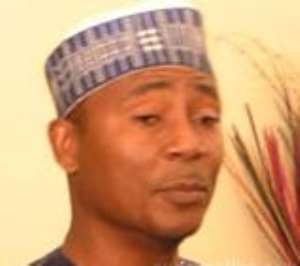
The out-going Northern Regional Minister, Alhaji Abubakar Saddique Boniface, has appealed to Ghanaian workers to inculcate the spirit of nationalism in the performance of their duties to enhance economic growth and social progress of the country.
He said the country was suffering because many workers were of the opinion that whether they worked or not they would be paid at the end of the month and this had led to the under productivity and stagnation in the economy.
Alhaji Boniface made the appeal at the launch of the "Governance Issues Forum"(GIF) programme for the Northern sector at a three-day training workshop in Tamale on Wednesday.
The workshop, which was on the theme: "Civic participation in the 2007 district budget process," was aimed at empowering citizens to participate in the making of public policy decisions at the local government level.
The Institute for Democratic Governance (IDEG) in collaboration with Ibis Ghana, a Danish NGO, organised the workshop for 60 participants from civil society organisations, government departments and agencies, as well as representatives from the private and public sectors from the Northern, Upper East and Upper West Regions
The participants would be taken through public deliberation, lobbying and advocacy, budget process and how to promote a more effective delivery of social services to the people.
Alhaji Boniface who spoke on: "Improving basic service delivery at the regional level," identified social service delivery as a problem impacting negatively on the livelihood of the people.
He mentioned the misplacement of development priorities, which he said had social, political and economic implications on the lives of the people and needed to be addressed.
He therefore, called for the provision of social services, such as health, water, education and roads in rural communities to impact positively on the socio-economic advancement of the people in particular and the country as a whole.
The Minister also called for more efficient information flow to equip the people with government policies and programmes to enable them to make an informed demand for their share of the national cake, hold public officers accountable, as well as monitor development projects in their communities.
Alhaji A.Y.M.B. Ibrahima, a Tamale businessman, urged the government to continue to pursue the policy of reducing its size and ceding some public sector functions to the private sector to enhance economic growth.
Alhaji Ibrahima, who was speaking on: "Private/Public sectors collaboration for enhance service delivery - What are the prospects and challenges," urged the government to take a critical look at the work processes of its departments and identify which parts could be given out to private operators.
"In all these, we should always have in mind our mission and vision towards national growth and development and the promotion of corporate social responsibility, as well as ethical business practices...", he said.
Alhaji Ibrahima, who is also the Managing Director of Baobab Group of companies mentioned agriculture, health and education as areas that needed private participation to enhance the livelihood of the people in Northern Ghana.
Madam Janet Sinayor, a Programme Officer of Social Enterprise Development (SEND) Foundation of West Africa, an NGO, called on civil society organisations to rekindle the spirit of voluntarism in the rural communities.
She said the lack of voluntary spirit among the rural people was impacting negatively on social service delivery, as some projects provided to the communities were not being patronised because the people did not see those projects as their own.
Dr. Lee Tlou, Research Fellow and Head of Training and Interface Unit of IDEG, lauded the growth of democracy in the country, especially in the areas of electoral processes, the rule of law and press freedom.
She observed however that what was lacking was engaging the people actively in the deliberative processes of democratic governance.




 'Kill whoever will rig Ejisu by-election' – Independent Candidate supporters inv...
'Kill whoever will rig Ejisu by-election' – Independent Candidate supporters inv...
 Ashanti Region: ‘Apologize to me for claiming I owe electricity bills else... – ...
Ashanti Region: ‘Apologize to me for claiming I owe electricity bills else... – ...
 Ghana is a mess; citizens will stand for their party even if they’re dying — Kof...
Ghana is a mess; citizens will stand for their party even if they’re dying — Kof...
 Internet shutdown an abuse of human rights — CSOs to gov't
Internet shutdown an abuse of human rights — CSOs to gov't
 Free SHS policy: Eating Tom Brown in the morning, afternoon, evening will be a t...
Free SHS policy: Eating Tom Brown in the morning, afternoon, evening will be a t...
 Dumsor: A British energy expert 'lied' Ghanaians, causing us to abandon energy p...
Dumsor: A British energy expert 'lied' Ghanaians, causing us to abandon energy p...
 What a speech! — Imani Africa boss reacts to Prof. Opoku Agyemang’s presentation
What a speech! — Imani Africa boss reacts to Prof. Opoku Agyemang’s presentation
 Dumsor: Tell us the truth — Atik Mohammed to ECG
Dumsor: Tell us the truth — Atik Mohammed to ECG
 Dumsor: Don't rush to demand timetable; the problem may be temporary — Atik Moha...
Dumsor: Don't rush to demand timetable; the problem may be temporary — Atik Moha...
 Space X Starlink’s satellite broadband approved in Ghana — NCA
Space X Starlink’s satellite broadband approved in Ghana — NCA
